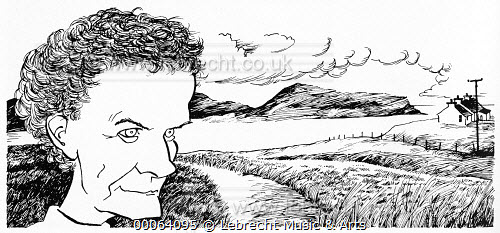Max was a shining comet. We all looked up in amazement.
mainThe Scottish composer John McLeod remembers his revered colleague, Peter Maxwell Davies.

There have been many wonderful tributes paid to Max this week and they amply testify, in all sorts of different ways, what he meant to the musical world and beyond. That so many people have expressed how much he influenced them – both personally and professionally – is quite extraordinary. No composer (and indeed most musicians) could escape the Max factor – whether you loved it or loathed it or indeed tried to be indifferent to it. His music, his ideas, his striving for originality or indeed his pontificating in the press about Muzak, musical education, swan eating or indeed any other agenda he set his mind to – Max seemed to be everywhere!
Max was never a close friend of mine, but we did meet up on numerous occasions either by accident – sometimes in the food section of M&S in Princes Street, Edinburgh where he used to stock up before returning to Orkney – or just by chance at concerts or other events as indeed happened about 18 months ago at the RAM, when we were both having a work done at a student concert. On that occasion we chatted about his newly finished 10th Symphony – a very long way from the first piece of his I ever encountered. But whatever the occasion, one always came away with something rather special. Whether it was those illuminating, penetrating eyes or his latest slant on a Chopin Ballade – no encounter with Max was ever boring or ordinary!
I first came across him in 1961 via The Musical Times magazine which at that time always used to include a piece of choral music as a so called ‘musical supplement’ – generally meant for amateur choirs . On this occasion is was a short choral work which Max had produced for his pupils at Cirencester Grammar School – I think it was part of ‘O Magnum Mysterium’.
Well, there was a plethora of letters from infuriated choral singers and conductors saying the music was virtually impossible and how dare The Musical Times print such stuff! Subsequently Max wrote back saying something like ‘I don’t know what all the fuss is about – my kids sang it in a few rehearsals!’ They did indeed – and subsequently recorded it on the Argo label.
My next real connection with Max was about 10 years later when he came to Glasgow with The Fires of London. He already had a reputation to shock and there were a lot of articles in the press about people walking out of the Proms premiere of ‘Worldes Blis’ in 1969. I remember the Glasgow occasion well and will never forget the way he leapt onto the platform to conduct the amazing ‘Vesalii Icones’ which included a dancer – William Louther – writhing about almost naked and making the Glaswegians blush. I thought at the time that Max and Simon Rattle shared the same hairdresser! He imbued all these performances with a tremendous physical presence – even if he was only sitting around at rehearsals. I got to know him a little more during the excellent series of Music Nova concerts in Glasgow organized by Alex Gibson (then Musical Director of RSNO) and Professor Fred Rimmer (Glasgow University) in the 1970s when Glasgow became besieged with visitors such as Ligeti, Berio, Lutoslawski and many others – almost a role call of contemporary composers.
Max was there, of course, and I remember in particular the premiere of a superb work – his ‘Stone Litany’ for soprano and orchestra. In 1980 I was also at the first performance in Edinburgh of, to my mind, one of his most inspired creations ‘The Lighthouse’ which went on to become one of his most frequently performed works. Our paths also crossed several times when he succeeded me as Associate Composer of the Scottish Chamber Orchestra in 1982 – an extremely fruitful association which resulted in the creation of the remarkable 10 Strathclyde Concertos.

There have been numerous, detailed and wonderful obituaries this week listing his many achievements and his astonishing catalogue of over 300 works so it would be remiss of me to repeat all this in what is a brief tribute. But I would like to recall just one incident when we met up on a plane journey to London – I was teaching at the RAM and he was about to rehearse the RPO in Tchakovsky’s 1st Piano Concerto. He was a little bit distant and on the ensuing tube journey into London he confessed that he was somewhat nervous of the slow movement – and the rather tortuous, fast entry for the cellos at one place! I ventured to remind him that it was no more difficult than parts of ‘Eight Songs for a Mad King!’ Also during that conversation I mentioned that my composition pupils at the City of Edinburgh Music School were having a concert of their short works the following week and rather boldly asked if he’d like to come along! ‘We’ll see’ he replied. Sure enough just before the concert began Max appeared with some friends to the delight of all my budding and nervous composers! That he also came and chatted to them all at the end also says a lot about the man!
Sir Peter Maxwell Davies was one of the most prolific, individual and important composers of the past 60 years and, whether we admit it or not, none of us has escaped his influence. He was a shining comet in the musical sky – whilst we all looked up in amazement!
(c) John McLeod/Slipped Disc





Comments